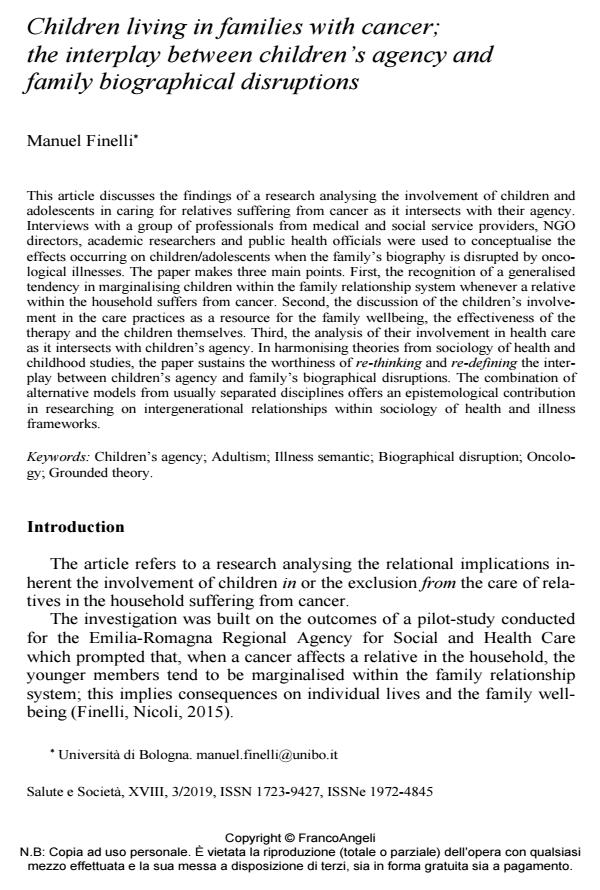Children living in families with cancer; the interplay between children’s agency and family biographical disruptions
Journal title SALUTE E SOCIETÀ
Author/s Manuel Finelli
Publishing Year 2019 Issue 2019/3 Language English
Pages 12 P. 72-83 File size 147 KB
DOI 10.3280/SES2019-003007
DOI is like a bar code for intellectual property: to have more infomation
click here
Below, you can see the article first page
If you want to buy this article in PDF format, you can do it, following the instructions to buy download credits

FrancoAngeli is member of Publishers International Linking Association, Inc (PILA), a not-for-profit association which run the CrossRef service enabling links to and from online scholarly content.
Keywords: Children’s agency; Adultism; Illness semantic; Biographical disruption; Oncology; Grounded theory.
- Ardigò A. (1997). Società e salute, lineamenti di sociologia sanitaria. Milano: FrancoAngeli.
- Belotti V. (2008). Verso pari opportunità tra generazioni. In: Belotti V., Ruggiero R., editors, Verso pari opportunità tra generazioni, in Vent’anni d’infanzia: retorica e diritti dei bambini dopo la convenzione dell’ottantanove. Milano: Guerrini e Associati.
- Bury M. (1982). Chronic illness as biographical disruption. Sociology of Health & Illness, 4(2): 167-182.
- Bury M. (1991). The sociology of chronic illness: a review of research and prospect. Sociology of Health & Illness, 13(4): 451-468.
- Carricaburu D., Ménoret M. (2007). Sociologia della salute. Bologna: Il Mulino.
- Charmaz K. (2006). Measuring pursuits, marking self: meaning construction in chronic illness. International journal of qualitative studies on health and wellbeing, 1/2006: 27-37. DOI: 10.1080/1748262050053448
- Corbin J., Strauss A. (1998). Basics of qualitative research; Techniques and Procedures for Developing Grounded Theory, II Edition. London: Sage Publications.
- Creswell J. (2013). Qualitative inquiry & research design, choosing among five approaches. Thousand Oaks: Sage Publications.
- Ennew J. (1994). Street and Working Children: A Guide to Planning. London: Save the Children Development Manuals.
- Favretto A.R., Zaltron F. (2013). Mamma, non mi sento tanto bene: la salute e la malattia nei saperi e nelle pratiche infantili. Roma: Laboratorio Infanzia e Adolescenza, Donzelli Editore.
- Favretto A.R., Fucci S., Zaltron F. (2017). Con gli occhi dei bambini; come l’infanzia affronta la malattia. Bologna: Il Mulino.
- Finelli M., Maggi S., Marchesi V., Rocca C. (2014). Ask Them: Child Participation in the Development of Educational Services. Canadian Journal of Children’s Rights, I/2014: 222-237.
- Finelli M., Nicoli A. (2015). La tutela dei minorenni nei percorsi terapeutici in oncologia seguiti dai familiari di riferimento; project report. Internal document. Roma: Agenzia Nazionale per i Servizi Sanitari Regionali.
- Holloway S., Valentine G. (2000). Spatiality and the New Social Studies of Childhood. Sociology, 34(4): 763-783. DOI: 10.1177/S003803850000046
- Hutchby I., Ellis J. (1998). Situating children’s social competence. In: Hutchby I., Ellis J., editors, Children and social competence. Arena of action. London: Routledge.
- James A., Prout A. (1990). A new paradigm for the sociology of childhood? Provenance, promise and problems. In: James A., Prout A., editors, Constructing and reconstructing childhood: contemporary issues in the sociological study of childhood. London: Routledge.
- James A. (2009). Agency. In: Qvortrup J., Corsaro J.W., Honig M.S., The Palgrave Handbook of Childhood Studies. New York: Palgrave & Macmillan.
- Jenks C. (2005). Childhood, II Edition. London: Routledge.
- Kleinman A. (1988). The illness narratives. Suffering, healing and the human condition. New York: Basic Books.
- Lansdown G. (1994). Children’s rights: Are we really respecting them? Educational and Child Psychology, 11(4): 18-23.
- Lupton D. (2012). Infant embodiment and interembodiment. Childhood A Global Journal of Child Research, 03/2012: 37-50. DOI: 10.1177/090756821244724
- Lusardi R., Manghi S. (2013). I limiti del sapere tecnico: i saperi sociali nella scena della cura. In: Vicarelli G., editor, Cura e salute. Prospettive sociologiche. Roma: Carocci.
- Mathieson C.M., Stam H.J. (1995). Renegotiating identity: cancer narratives. Sociology of Health e Illness, 17(3): 283-306.
- Maturo A. (2004). I precedenti nella storia del pensiero sociologico. In: Cipolla C., editor, Manuale di sociologia della salute. I. Teoria. Milano: FrancoAngeli.
- Maturo A. (2013). L’effetto moltiplicatore della soddisfazione del paziente. In: Ardissone A., Maturo F., editors, Disuguaglianze sociali e vissuto dei malati oncologici. Milano: FrancoAngeli.
- Mayhall B. (1998). Towards a sociology of child health. Sociology of health and illness, 20(3): 269-288. DOI: 10.1111/1467-9566.0010
- Montreuil M., Carnevale F. (2016). A concept analysis of children’s agency within the health literature. Child Health Care, 20(4): 503-511. DOI: 10.1177/136749351562091
- Prout A. (2005). The future of childhood: towards the interdisciplinary study of children. London: Routledge.
- Punch K.F. (2000). Developing Effective Research Proposals Essential Resources for Social Research. Thousand Oaks: Sage Publications.
- Ronfani P. (1995). I diritti del minore. cultura giuridica e rappresentazioni sociali. Milano: Perini scientifica.
- Salamonsen A., Kiil M.A., Kristoffersen A.E., Stub T., Berntsen G.R. (2016). My cancer is not my deepest concern: life course disruption influencing patient pathways and health care needs among persons living with colorectal cancer. Patients preference and adherence, 2016(10): 591-600. DOI: 10.2147/PPA.S108422
- Seale C., Gobo G., Gubrium J.F., Silverman D. (2004). Qualitative Research Practice. Thousand Oaks: Sage Publications.
- Smith C. (1990). Vicino alla morte. Guida al lavoro sociale con i morenti e i familiari in lutto. Trento: Erikson.
- Todres L., Galvin K.T., Holloway I. (2009). The humanization of healthcare: a value framework for qualitative research. International Journal of Qualitative Studies on Health Wellbeing, 4(2): 68-77. DOI: 10.1080/1748262080264620
- United Nations (1989). Convention on the Rights of the Child. New York: United Nations.
- Zeiher H. (2001). Dependent, independent and interdependent relations: children as members of the family household in West Berlin. In: Alanen L., Mayall B., editors, Conceptualising Child–Adult Relations. London: Routledge
Manuel Finelli, Children living in families with cancer; the interplay between children’s agency and family biographical disruptions in "SALUTE E SOCIETÀ" 3/2019, pp 72-83, DOI: 10.3280/SES2019-003007